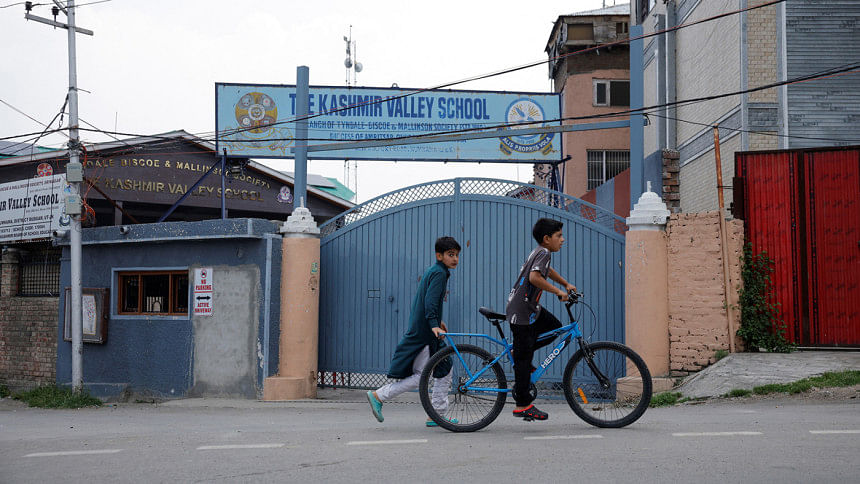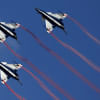Normality returns as nuclear-armed neighbours step back from the brink

Key updates-
- India, Pakistan agree to stop all fighting after days of missile, drone attacks
- Trump announces surprise ceasefire, congratulates two nations on using 'common sense'
- US State secretary, vice president also actively involved in mediation
- Reports of ceasefire violations from both sides of LoC
- Indian officials say 'punitive measures' announced after Pahalgam attack remain in place
- Pakistan PM calls for dialogue, urges peace talks on Kashmir, water issues
Normality returns to the Subcontinent after Pakistan and India agreed on Saturday to a full and immediate ceasefire after days of deadly jet fighter, missile, drone and artillery attacks — news surprisingly announced by US President Donald Trump, who congratulated them on using "common sense".
Officials from Islamabad and New Delhi confirmed the development minutes after Trump posted the announcement on his Truth Social network, as the conflict between the nuclear-armed neighbours appeared to be spiralling towards a full-blown war.
"After a long night of talks mediated by the United States, I am pleased to announce that India and Pakistan have agreed to a FULL AND IMMEDIATE CEASEFIRE. Congratulations to both Countries on using Common Sense and Great Intelligence," Mr Trump posted.
In a statement on X, Foreign Minister Ishaq Dar said: "Pakistan and India have agreed to a ceasefire with immediate effect. Pakistan has always strived for peace and security in the region, without compromising on its sovereignty and territorial integrity," he added.
Indian foreign secretary Vikram Misri said the two countries' military operations chiefs had spoken to each other and agreed that all fighting would stop at 5pm Indian time (1130 GMT), without using the word "ceasefire". He said the two DGMOs would speak to each other again on May 12.
Dar told Geo News that military channels and hotlines between India and Pakistan had been activated, and three dozen countries had actively helped to facilitate the agreement.
Prime Minister Shehbaz Sharif thanked US President Donald Trump for his "leadership and proactive role" in helping Pakistan and India achieve peace in the region. "Pakistan appreciates the US for facilitating this outcome, which we have accepted in the interest of regional peace and stability," he said in a post on X.
The ceasefire comes after four days of attacks and counter-attacks by both sides that killed at least 60 people and saw thousands of civilians flee their homes along their border as well as in Azad and occupied Kashmir.
The fighting was touched off by an attack last month in the India-held Kashmir town of Pahalgam that killed 26 tourists, which Delhi blamed on Islamabad.
Pakistani military sources said armed forces had shot down at least 77 Israeli-made high-tech drones, while Indian officials claimed they had destroyed hundreds of Pakistani drones, many Turkish-made.
Pakistan also says it downed five Indian warplanes — including three French Rafale fighter jets — although New Delhi has not confirmed any losses.
This was the first time the two nations used drone attacks on a large scale against each other. Both countries have been developing their own drones, and they also import them.
Punitive measures in place
Despite the truce, two Indian government sources told Reuters that the punitive measures announced by India and reciprocated by Pakistan, such as trade suspension and visa cancellations, would remain in place for now.
The sources also said the 1960 Indus Waters Treaty, a critical water-sharing pact that India suspended after the Pahalgam attack, would continue to remain in abeyance.
Meanwhile, in contradiction to Mr Misri's statement that the Directors General of Military Operations (DGMOs) of Pakistan and India would "talk again on May 12 at 12pm (11:30am Pakistan time)", the Indian Ministry of Information and Broadcasting reported that "there is no decision to hold talks on any other issue at any other place".
Quoting its Ministry of External Affairs, the Indian information ministry tweeted that the "stoppage of firing and military action between India and Pakistan was worked out directly between the two countries".
"The Pak DGMO initiated the call this afternoon after which discussions took place and understanding reached," it added.
Positive step
"The ceasefire is a positive step," said Bilal Shabbir, an IT consultant in Muzaffarabad. "In war, it's not just soldiers who die, it's mostly civilians — and in this case, it would have been the people of Kashmir."
Ehsan Malik, CEO of the Pakistan Business Council, said both Pakistan and India "need to lift their large populations on virtually every measure of socio-economic development. We are happy that a ceasefire will help both governments to focus on this priority".
Shuja Nawaz, distinguished fellow at the Atlantic Council's South Asia Centre, said the Indus treaty would figure prominently in the impending talks "after a decent interval, which allows both governments to claim credit for what they've achieved until now".
However, within hours after the ceasefire, violations were reported from both sides of the Line of Control (LoC).
Blasts were heard in Srinagar and Jammu and projectiles and flashes were seen in the night sky over Jammu, similar to the events of the previous evening, according to authorities, residents and Reuters witnesses.
Residents in the city of Barnala, in Azad Kashmir, reported hearing exchanges of fire along the line dividing the region, according to the New York Times.
Military spokespeople in both countries did not immediately respond to requests for comment.
Separately, occupied Kashmir's chief minister Omar Abdullah posted on X: "What the hell just happened to the ceasefire? Explosions heard across Srinagar!!!"
There were also reports from different border regions of skirmishes. Some reports also said that drones were spotted hovering over Bahawalpur.
Dawn learnt that the drones were spotted after Isha prayers, prompting citizens to come out of their homes. However, sources said the presence of Unmanned Aerial Vehicles (UAV) is not a matter of concern as it may happen for a few days after a truce is brokered.
When contacted the district emergency officer, Police Emergency 15, Rescue 1122 Emergency Office and other security institutions, it was told that the situation was being cleared.
Deputy Commissioner Bahawalpur Dr Farhan Farooq told this scribe, via WhatsApp message, that "all intercepted" and no damage so far, Alhamdolillah".
Rubio lauds PMs
US Secretary of State Marco Rubio later revealed that he and Vice President JD Vance had been in direct contact with senior Pakistani and Indian officials, including Prime Ministers Shehbaz Sharif and Narendra Modi, over the past two days.
In a statement released by his office, Mr Rubio said: "Over the past 48 hours, Vice President Vance and I have engaged with senior Indian and Pakistani officials, including Prime Ministers Narendra Modi and Shehbaz Sharif, External Affairs Minister Subrahmanyam Jaishankar, Chief of Army Staff Asim Munir, and National Security Advisors Ajit Doval and Asim Malik."
He added, "I am pleased to announce the governments of India and Pakistan have agreed to an immediate ceasefire and to start talks on a broad set of issues at a neutral site."
He also commended PMs Sharif and Modi on "their wisdom, prudence, and statesmanship in choosing the path of peace."
Vance, who had earlier said the conflict was "fundamentally none of our business", also endorsed the deal by reposting Mr Trump's statement on X.
"Great work from the president's team, especially Secretary Rubio," Mr Vance wrote. "And my gratitude to the leaders of India and Pakistan for their hard work and willingness to engage in this ceasefire."
In a separate statement, State Department Spokesperson Tammy Bruce said that Mr Rubio spoke with Mr Dar. "Secretary Rubio reiterated that both parties must find ways to de-escalate the current situation and re-establish direct communication to avoid miscalculation. He also offered US assistance in starting constructive talks in order to avoid future conflicts," she added.
Bruce said that Mr Rubio also spoke with the Indian foreign minister and "emphasised that both sides need to identify methods to de-escalate and re-establish direct communication to avoid miscalculation".
Secretary Rubio "further proposed US support in facilitating productive discussions to avert future disputes", Ms Bruce added.
PM calls for dialogue
Hours after the ceasefire was announced, PM Shehbaz on Saturday expressed hope that a process of peace dialogue would take place to resolve all contentious issues between the two nuclear states, including fair distribution of water resources and the Kashmir issue.
In his address to the nation, the prime minister said Pakistan responded positively to the option of ceasefire for international and regional peace and for the sake of millions of people in the subcontinent.
He thanked opposition parties, political forces and friendly nations, including the United States, for their constructive and effective role in de-escalating tensions.
"We responded positively to the option of ceasefire for the sake of international and regional peace and millions of people," PM Shehbaz said.
The premier extended special thanks to China and President Xi Jinping, saying, "China stood by Pakistan without concern for any personal gain or loss."
He also expressed gratitude to other world leaders, including the US President Donald Trump, Turkiye President Recep Tayyip Erdoğan, Saudi Crown Prince Mohammad bin Salman, Sheikh Mohammed bin Zayed, Qatar Emir Sheikh Tamim bin Hamad, and UN Secretary General António Guterres.
The prime minister congratulated the whole nation and armed forces for the victory in the standoff with India and said: "Today we got a historic victory. It is the victory of our principles."
The premier said India played a shameful role in these days and Pakistani nation and armed forces gave a befitting response to the enemy what it deserved.
"In the pretext of Pahalgam incident, India imposed war on us and attacked our civilian population through drones and missiles. Then we decided that the issues which should have been resolved through dialogue, will be settled in battlefield," he added.
Dar engages counterparts
Foreign Minister Dar also talked to his counterparts in China, Saudi Arabia and Turkiye and apprised them of the current situation in the region following last night's Indian aggression and Pakistan's subsequent response.
Chinese Foreign Minister Wang Yi acknowledged Pakistan's restraint and reaffirmed that China would continue to stand firmly by Pakistan.
Saudi Arabia Foreign Minister Faisal bin Farhan expressed condolences over the loss of innocent lives and appreciated Pakistan's measured response.
Turkish Foreign Minister Hakan Fidan also lauded Pakistan's restrained response.

 For all latest news, follow The Daily Star's Google News channel.
For all latest news, follow The Daily Star's Google News channel. 








Comments